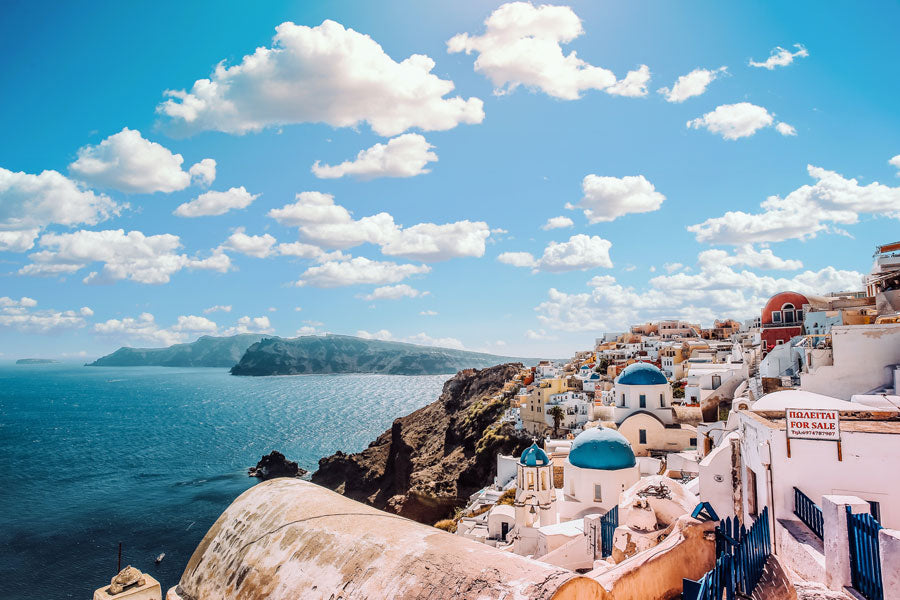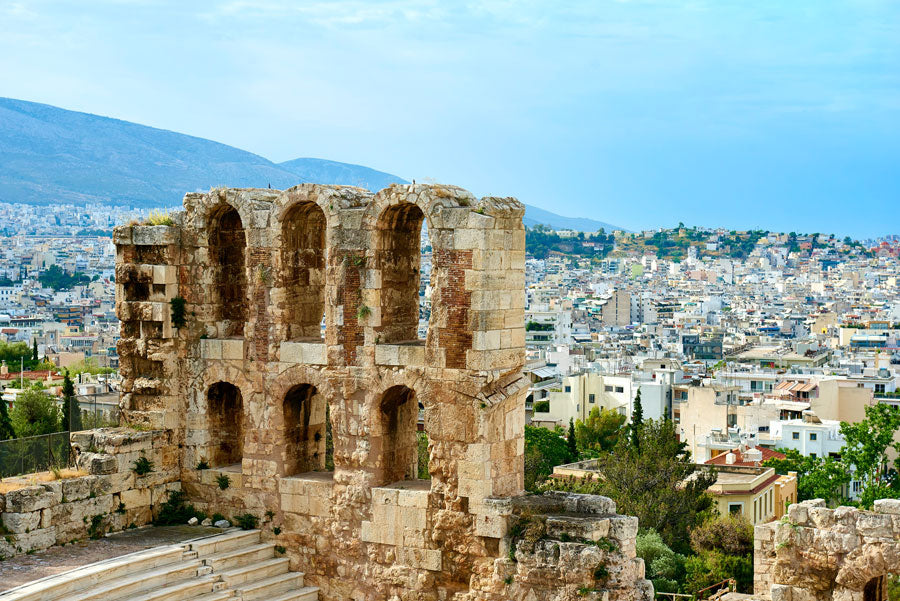Planning a Trip to Greece (2021 Guide)
Oct 16, 2020
There are a few things you should know when planning a trip to Greece: what will it cost, when is the best time to visit it, what documents to prepare, what cities and places to visit, where to stay and how to best spend your time. We have covered all of those topics in our extensive guide. Read on!
When Should You Visit Greece
Greece has the nicest weather from late April to early November. If you want to swim in the Adriatic and sunbathe, go from June to September, when the average maximum temperature is from 32 °C (90 °F) to 36 °C (97 °F). Because of the great weather, July and August are the most popular months, which is why the accommodation is the priciest during that period.
Greece is a warm Mediterranean country, so you can visit it during the winter, too. Make sure to take a warm jacket, hat, scarf and gloves in case it gets cold.
Do You Need Visa to Visit Greece
Greece is a member of the European Union, so if you are traveling within the E.U., you only need an identity card to enter it. However, it is recommended to take your passport in case it is required for transactions such as currency exchange or during airport controls. As for Visas, the rules are as follows:
- Europe (Schengen Area): Not required for stays less than 90 days.
- The United States: Not required for stays less than 90 days.
- Australia: Not required for stays less than 90 days.
- Canada: Not required for stays less than 90 days.
- New Zealand: Not required for stays less than 90 days.
- Europe (Non-Schengen Area): Visa may be required.
- Other countries: Visa may be required.
Visit the pages of Hellenic Republic's Ministry of Foreign Affairs to find out whether you need a Visa or not.
Places to Visit in Greece
Greek cities and islands offer ancient architecture, spectacular views and crazy parties. Here are some of the most popular choices.
Mighty Athens
The capital of Greece is packed with history and culture. In fact, this is one of the world's oldest cities and has been inhabited for more than 3400 years. The city has plenty of monuments and among the most popular ones are the Acropolis and the Temple of Olympian Zeus.
Beautiful Santorini
If you have seen pictures of white Cycladic houses with blue doors and windows, you were probably looking at pictures of Santorini. The island usually attracts richer tourists, but there are also accommodation options that are not so fancy. Filled with restaurants and terraces offering a stunning view, this destination is perfect for anybody looking for a relaxing holiday that will satisfy all the senses.

Santorini - Greece, picture by Aleksandar Pasaric on Pexels.com
Unforgetable Mykonos
Mykonos is another Cycladic island offering high-end accommodation and entertainment, as well as great food. If you want to party after a day of sunbathing, Mykonos is the right place for you, as the island is very well known for its exciting nightlife and many clubs.
Other places worth visiting are:
Where to Stay in Greece
When planning a trip to Greece, hotel vs Airbnb is one of the most frequently thought-about questions. You can lower your costs by not staying close to a city center, by traveling with a group or sharing your room.
Where to stay in Athens
As Athens is known for its monuments, it is best to visit it at the beginning of your trip, when you have the most energy for walking and exploring! You can choose between hotels, hostels and Airbnbs. Choose a hostel if you are looking for an economic choice and do not mind sharing a room with strangers. Airbnbs will give you more comfort than a hostel but are certainly less expensive than Athens’ hotels.
Where to stay in Santorini
The view of the cliffs into the caldera are stunning, so this is where the most expensive accommodation can be found. Still, you can find a place for a great price if you come with a group of friends and stay away from the most popular areas. Many do not recommend using Airbnb for Santorini because the location of the rentals is often not ideal — the best places are usually hotels with better rates on Booking.
Where to stay in Mykonos
This partying mecca is super busy during the summer season and its popularity has a downside — high accommodation prices. Even their mid-range options are higher than elsewhere. Still, if you do thorough research (and decide to treat yourself a bit) you can surely find an accommodation that will be right for you.

Mykonos Greece - picture by Adijana on Pexels.com
Transport in Greece
If you want to get in a full European spirit, you will be happy to hear that most Greek towns are small enough to get around on foot. Of course, you will need to use their public transport system as well, so take a look.
Bus
Local busses are the most useful in bigger Greek cities, like Athens, Patra, Kalamata and Thessaloniki. Getting a 90-minute bus ticket in Athens will cost you €1.20 ($1.40) and a 5-day ticket €8.20 ($9.60). A bus ticket for a 5.5-hour ride from Athens (South of Greece) to Thessaloniki (North of Greece) costs from €38 ($44.60).
Metro
If you are in Athens, you can use their fairly good underground system. The Athens Metro has three lines and connects its important landmarks, like the Acropolis, Port of Piraeus, Central Railway Station and the Olympic Stadium. A 3-day tourist ticket that includes return transport from the airport costs €22 ($25.80).
Taxi
Except on remote islands, taxis are widely available in Greece. The prices are reasonable for European standards, especially if you are sharing a ride with three or four people. Keep in mind that the rates might double at night and that additional costs might be charged for trips to and from the airport.
Important Notes about Visiting Greece
When traveling to Greece, remember that tipping is optional, your best daily makeup routine is wearing sunscreen, one of the best ways to see the whole country is renting a car and you can cut your costs by booking in advance and visiting off-season. Also:
- Get an International Driving Permit: Drivers from the US and certain other non-EU countries like Canada and Australia should have an IDP if they want to drive anywhere in the country.
- Beware of the thieves: Pickpocketing in Athens is not uncommon, especially in touristy areas like around the Acropolis. There are police patrols on foot and motorcycles but be aware of your surroundings and keep an eye on your day bag, jackets, etc.
Planning a trip to Greece: what to bring
On every trip to Europe, you should take comfy clothes and shoes, a practical day bag, a power bank and a travel adapter. Take a look at the full travel packing list for Europe. With that being said, follow these specific tips for planning a trip to Greece.
- Prepare cash: Although credit and debit cards are accepted at most larger businesses, most stores prefer taking cash. Also, there is no guarantee that all Greek islands have ATMs. Do not be afraid of using an ATM that does not have an English sign — after you insert a foreign card, there will most likely be an English pop-up.
- Fight off mosquitoes: If you are visiting Greece during summer when the temperatures are high and the humidity levels rise, expect to see lots of mosquitoes. Make sure to get a good nights' sleep and use a bug repellent.
Sample 7 Day Greece Itinerary
Deciding what to do on your trip when you are already there can be stressful. Plan your activities beforehand, do a quick research of transportation and accommodation options, know the schedules and the opening hours of museums and restaurants — and enjoy your trip stress-free!

Athens Greece - picture by Josiah Lewis on Pexels.com
Planning a 7 day trip to Greece
Day 1: Athens
Visiting the capital and its most fascinating archaeological sites is a must. Buy a ticket that allows you to check out the best-known attractions for a lower price and start exploring the Acropolis, the Dionysus Theater, the Ancient Agora, the Hadrian’s Library, the Roman Agora and the Acropolis Museum.
Day 2: Athens
Visit the rest of the city and the monuments that you have not seen on the first day, like the Temple of Olympian Zeus and the Syntagma Square.
Day 3: Meteora
Reserve day three for a trip to Meteora, where you will find spectacular monasteries integrated with the natural landscape.
Day 4: Mykonos
One of the most visited Greek destinations is famous for the white and blue color combination you can see on its streets. Spend your day walking through the old town and end your day by visiting the historic Boni mill.
Day 5: Mykonos
Many say that Mykonos beaches are like paradise on Earth. Dedicate one day of your trip to enjoying them to the fullest.
Day 6: Santorini
After a day of relaxing, you are ready to get back to sightseeing. Visit the spectacular island of Santorini and its gems — the Metropolitan Orthodox Cathedral and the Catholic Cathedral of San Juan Bautista.
Day 7: Santorini
Spend your last day on the Red Beach Santorini, a popular Greek beach that resembles Mars because of its red-colored rocks.
With this itinerary you will get to explore both the mainland and the far-flung islands. Visit this extremely special European country and scratch it off your bucket list!

